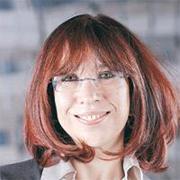Why does Turkey need futurists?
Paylaş
LinkedinFlipboardLinki KopyalaYazı Tipi
The Futurists Association of Turkey was established just a couple of years ago, founded by Brightwell Holding CEO Alphan Manas, a colorful figure who is a textile engineer by trade but describes himself as a futurist, an inventor, a technology expert and an investor. He is the creator of the OGS system used on Istanbul bridges, the İDDAA betting system and the Ferry Taxi.
Manas, who is also a member of the Sustainable Development Association, recently gave students at Bahçeşehir University a lecture on the professions of the future. As you can imagine, his comments on which professions young people in developing countries such as Turkey should consider grabbed the students’ attention.
The "professions of the future" include jobs in nanotechnology, genetic engineering, robotics and plastic surgery, with the field of organic farming topping the list, said Manas.
Organic farming’s rosy future
Manas closely follows world trends and frequently visits other countries, especially the United States. In the future, he says, organic farming will see a boost, so organic food engineers, field experts and product marketers will all be needed.
The question I asked in my title has something to do with what Manas explained. He generates future scenarios and organic farming leads the list of scenarios that he came up with for Turkey. I wonder if I can clearly explain why administrators of this country should lend an ear to futurists like Manas. For many days, we have been talking about organic farming after landmines in the Southeast are removed.
Landmine bill was withdrawn, butÉ
Facing fierce criticism, the ruling Justice and Development Party, or AKP, had to withdraw the landmine bill that envisioned leasing the area to foreign companies for 44 years after the mines are cleared.
This criticism reached its peak after it was announced that the company to clear the landmines would be awarded with the use of these fields for organic farming.
Gökhan Günaydın, the head of the Agriculture Engineers Association, says the land is quite suitable for organic farming, so the bottom line is that the said piece of land is ideal for the future of agriculture, with two key ingredients coming together.
If administrators in Ankara had been familiar with the futurists’ scenarios, I wonder if they could have let the idea to lease this land to foreigners.
In the meantime, the Democratic Party, or DP, has made an interesting offer after electing its new leader, suggesting that a public investment company be set up to remove landmines and then allowed to use the area for 49 years.
This company would at the same time have a share in the revenues of both domestic and international investments here.
Stocks of this prospective company would be distributed free among locals to support education. Families with boys would be given one share, and families with girls would be given two.
According to the DP’s calculations, after the landmines are removed, production on this very same land will be worth 100 million Turkish Liras. (The party does not note, however, whether or not this production would be organic farming.)
That would mean that a family sending two girls to school would be provided with 2,000 liras between 2015 and 2020 Ğ an important suggestion for the development of the Southeast.
The "professions of the future" include jobs in nanotechnology, genetic engineering, robotics and plastic surgery, with the field of organic farming topping the list, said Manas.
Organic farming’s rosy future
Manas closely follows world trends and frequently visits other countries, especially the United States. In the future, he says, organic farming will see a boost, so organic food engineers, field experts and product marketers will all be needed.
The question I asked in my title has something to do with what Manas explained. He generates future scenarios and organic farming leads the list of scenarios that he came up with for Turkey. I wonder if I can clearly explain why administrators of this country should lend an ear to futurists like Manas. For many days, we have been talking about organic farming after landmines in the Southeast are removed.
Landmine bill was withdrawn, butÉ
Facing fierce criticism, the ruling Justice and Development Party, or AKP, had to withdraw the landmine bill that envisioned leasing the area to foreign companies for 44 years after the mines are cleared.
This criticism reached its peak after it was announced that the company to clear the landmines would be awarded with the use of these fields for organic farming.
Gökhan Günaydın, the head of the Agriculture Engineers Association, says the land is quite suitable for organic farming, so the bottom line is that the said piece of land is ideal for the future of agriculture, with two key ingredients coming together.
If administrators in Ankara had been familiar with the futurists’ scenarios, I wonder if they could have let the idea to lease this land to foreigners.
In the meantime, the Democratic Party, or DP, has made an interesting offer after electing its new leader, suggesting that a public investment company be set up to remove landmines and then allowed to use the area for 49 years.
This company would at the same time have a share in the revenues of both domestic and international investments here.
Stocks of this prospective company would be distributed free among locals to support education. Families with boys would be given one share, and families with girls would be given two.
According to the DP’s calculations, after the landmines are removed, production on this very same land will be worth 100 million Turkish Liras. (The party does not note, however, whether or not this production would be organic farming.)
That would mean that a family sending two girls to school would be provided with 2,000 liras between 2015 and 2020 Ğ an important suggestion for the development of the Southeast.
Paylaş
LinkedinFlipboardLinki KopyalaYazı Tipi








